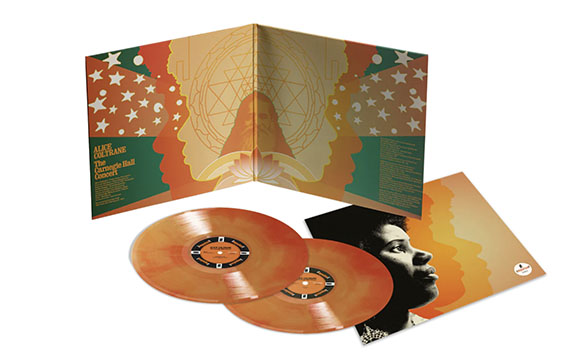
New Alice Coltrane album from the 1971 Carnegie Hall benefit concert.
In March 2024, Impulse! Records (whose parent company is Universal Music Group), released the live recording of Alice Coltrane (Swamini A.C. Turiyasangitananda) that was part a benefit concert held in 1971 for the Integral Yoga Institute of New York. This new album release is part of the 2024 “Year of Alice,” conceived of by The John & Alice Coltrane Home and the Coltrane Family—in partnership with Impulse! Records, Detroit Jazz Festival, Hammer Museum, Alonzo King LINES Ballet, The New York Historical Society, and many more— celebrating the extensive life work of Coltrane.
Amid the ebb and flow of grief following the passing of her beloved husband, jazz luminary John Coltrane in 1967, Alice Coltrane embarked on a transformative journey that transcended the realms of both geography and spirituality. This odyssey of the soul, chronicled in the annals of her life’s narrative, Monument Eternal, found its crescendo in a singular night in 1971 at New York’s venerable Carnegie Hall—a night that would stand as a testament to the indomitable spirit of artistic expression and the transformative power of music imbued with spiritual essence.
December 1970 marked a pivotal moment in Alice’s life as she embarked on a pilgrimage to the fabled lands of the Indian subcontinent, accompanying her Guru and spiritual mentor, Swami Satchidananda, along with several other students. “Having made the journey to the East, a most important part of my sadhana (spiritual practice) has been completed,” Alice later reflected. From the sacred banks of the Ganges to the serene ashram sanctuaries nestled amidst the Himalayan peaks, to a Yoga retreat in Sri Lanka (then Ceylon) Alice immersed herself in the timeless wisdom of the East, seeking enlightenment amid the tapestry of ancient traditions and sacred rituals. Her sojourn, spanning five weeks of spiritual exploration and introspection, became a crucible of transformation—a journey that would irrevocably alter the course of her life and music.
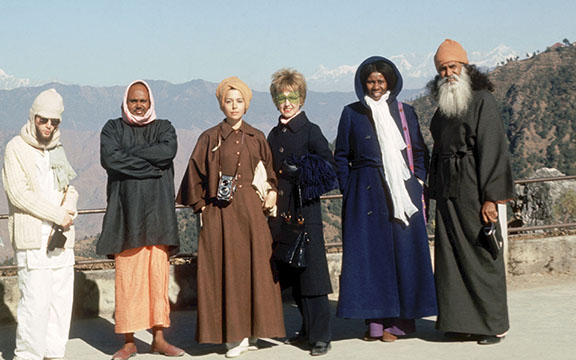
Photo: Alice Coltrane next to Swami Satchidananda, Himalayas, India, 1970.
Upon her return from the mystical lands of the East, Alice found herself standing at the threshold of Carnegie Hall, a bastion of artistic expression and cultural resonance. “The trip to the East gave me the spiritual motivation to come out more—to do more with my music. I also listened to a lot of beautiful sitar and vina music…and I’m going to use some of the chants I heard…some of the essence of the East,” she told Essence magazine in an interview. The 1971 concert was a benefit for the Integral Yoga Institute (IYI) of New York, which was founded by Swami Satchidananda in 1966. The IYI was in the process of expanding from an apartment on West End Avenue in New York City to a building it was to purchase on 13th Street in the West Village, which it still operates today. Alice had been a generous benefactor, when, in 1970, she quietly wrote a check toward the down payment for that building.
As writer Lauren Du Graf noted in the liner notes accompanying the new album release, “Alice was drawn to the universality of Satchidananda’s teachings, which promoted the idea of divine unity beyond the particularities of religious difference—sentiments which echoed her late husband’s values. But the swami’s most useful and enduring lesson, according to Alice, was pragmatic advice on how to approach work. Her anguish in the wake of her husband’s death had been amplified by the responsibility of dealing with the enormity of the work he left behind.” Du Graf further notes, “It was Satchidananda who Alice would credit with helping her cope with crippling pressure of her workload, while still enabling her to be productive. His advice to her was to practice non-attachment in her working life. ‘Say, if you want to build a ship, build it in a detached manner,” she later recounted in a 2002 interview published in The Wire. ‘Don’t build it subjectively, don’t build it by putting your full faith into a technical, temporary, mundane, or materialistic thing. Go about it in a detached way. Detached doesn’t mean disliked, it just means that I don’t want this project to consume me. It will if I allow it. If I subject myself it ends up binding and controlling me. I can’t sleep at night because that’s all I’m concerned about. So I will go and do my work objectively. That’s one of the best lessons I’ve learned that he taught us.’”
In January of 1969, months before the Woodstock Festival and Swami Satchidananda’s key role in opening it, the IYI organized a “concert” at Carnegie Hall. It featured a Hatha Yoga demonstration by several of Sri Swamiji’s students, sitar music, and then a talk by him. Tickets sold out instantly. Two years later, Sid Bernstein organized and produced the 1971 Carnegie Hall benefit. Bernstein had brought the Beatles to Carnegie Hall in 1964 and later to Shea Stadium. He also managed the Rascals (then called “The Young Rascals) and two of the band’s members (Felix Cavaliere and Eddie Brigati) were students of Swami Satchidananda. Along with the usual mix of cigarette and liquor ads one finds in such printed programs back in the day, the February 21, 1971 program distributed that evening described the Concert as a benefit for the Integral Yoga Institute, “a non-profit, non-sectarian organization dedicated to the study, practice and promotion of Integral Yoga. Integral Yoga is a synthesis of specific methods which bring the harmonious development of the individual and the peaceful evolution of the community.”
The concert may have seemed an unusual mix of musicians with its inclusion of Laura Nyro, the Rascals, Alice Coltrane, and Pharoah Sanders. All but Sanders were disciples of Swami Satchidananda. Coltrane and Cavaliere had recently traveled to India and Sri Lanka with Sri Swamiji, and Nyro spent time with him in New York and Connecticut—later purchasing the home where he had lived prior to opening his Connecticut ashram. Unfortunately, Sri Swamiji was unable to attend the benefit concert as he was still on his World Peace Tour where Alice had joined him in India and Sri Lanka.
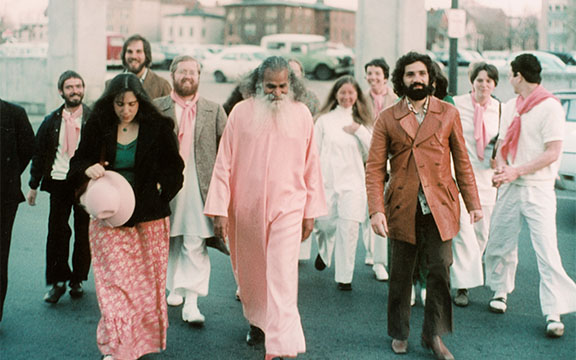
Photo: Laura Nyro and Felix Cavaliere , next to Swami Satchidananda, along with IYI students in Connecticut, early 1970s.
Two other musicians who were also students, Kumar Kramer and Tulsi Reynolds, joined Coltrane onstage playing tamboura and harmonium. Reynolds recently noted, “He was easily the most beautiful human being that ever walked the earth. If you were to imagine what God looked like—he looked like Swami Satchidananda.” Nyro opened the evening, playing piano and singing for a 20-minute set. Her biographer, Michele Kort, noted that Nyro also gave a “surprisingly long rap about the Guru,” in which she recounted some personal advice he gave her when she consulted him about romantic challenges in her love life.
The Carnegie Hall stage, bathed in the soft glow of anticipation, awaited Alice’s presence—a presence that would infuse the hallowed halls with the ethereal strains of spiritual jazz and transcendental melodies. In the corridors of Carnegie Hall, Alice found not merely a venue for artistic performance, but a sacred space—a sanctum where music became a conduit for spiritual revelation and communion with the divine.
Alice took to the stage, her fingers poised delicately over the strings of her harp—a vessel for the celestial harmonies that resided within her soul. She played both harp and piano string weaving a tapestry of sound—a celestial symphony that transcended the boundaries of time and space. “Music is a celestial sound and it is the sound that controls the whole universe,” Swami Satchidananda proclaimed when he opened the Woodstock Festival in 1969. The audience, a mosaic of seekers and enthusiasts, bore witness to a musical odyssey—an exploration of the inner landscape of the soul, inspired by the luminous beacon of Swami Satchidananda’s teachings.
In the ethereal realm of music, Alice found solace and sanctuary—a refuge from the tumultuous currents of earthly existence. Her compositions, infused with the essence of divine love and spiritual devotion, became hymns of praise—a testament to the transformative power of music as a vehicle for spiritual awakening. Through the medium of sound, she embarked on a quest for enlightenment that found its culmination in the harmonies of the soul.
The concert program, meticulously curated with reverence, reflected Alice’s unwavering commitment to her Guru’s teachings. Each composition, a reflection of her spiritual journey, resonated with the timeless wisdom of the East—a wisdom that transcended the boundaries of language and culture, speaking directly to the heart of all who listened. From the sacred chants of ancient Vedic hymns to the improvisational flights of jazz, Alice’s music became a testament to the universal language of the soul—a language that spoke of unity, harmony, and divine love.
As the final notes of her performance echoed through the hallowed halls of Carnegie Hall, a profound sense of peace descended upon the audience—a peace born of spiritual communion and transcendental revelation. The concert was not merely a performance—it was a sacred rite, a communion of souls bound together by a shared quest for higher consciousness. Through the transformative power of music, Alice Coltrane had created a portal to the divine—a portal through which the eternal melodies of the universe flowed, carrying with them the promise of spiritual renewal and transcendence.
After the 1971 Carnegie performance, Alice embarked on a journey alongside Swami Satchidananda, venturing to Chicago where they made appearances on a televised talk show and she graced another benefit for the Institute. The summer breeze carried with it the echoes of her melodies as she continued to spread the message of spiritual harmony across the nation. By 1976, a new chapter unfolded in Alice’s spiritual unfoldment as she received a mystical transmission—a revelation that it was time for her to embrace the life of a swamini (female Hindu monk) and become “Turiyasangitananda,” Sanskrit for: “the True Self’s highest song of bliss.” This metamorphosis marked her complete withdrawal from secular pursuits, symbolizing a profound commitment to her spiritual life.
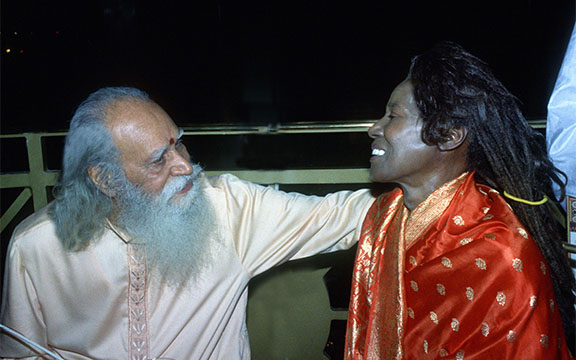
Photo: Swamini A.C. Turiyasangitananda with Swami Satchidananda, New York, 1996.
In 1982, Alice planted the seeds of spiritual awakening in the fertile soil of Agoura Hills, California, where she founded the Sai Anantam Ashram. Nestled amidst the majestic Santa Monica mountains, this sanctuary became a haven for seekers of truth and disciples of divine love and where kirtan music she composed flowed. Her music, with its fusion of jazz and spiritual elements, became a beacon of hope and inspiration for countless souls around the world. Reflecting on her journey, Alice once said, “My music isn’t jazz, not really. It is closer to spiritual music. It’s universal and it’s freedom.” Indeed, her music transcended genres and boundaries, touching the hearts of listeners from all walks of life. It was a testament to the power of music to unite, uplift, and inspire—a power that Alice wielded with grace and humility.
Now known as Swamini A.C. Turiyasangitananda, she shed the role of a mere student and ascended to the stature of Guru in her own right, while remaining in close relationship to Swami Satchidananda who was so instrumental in guiding her on her spiritual journey. In 2003 she spoke about him noting, “He was a great person and a great yogi. He gave the best lectures, and he was very universally minded. I didn’t seek any spiritual guidance from anyone else after him.”
In the years that followed, Swamini A.C. Turiyasangitananda continued to explore the intersection of music and spirituality as a timeless reminder of the boundless potential of the human spirit to transcend earthly limitations and soar to the heights of spiritual enlightenment. May her legacy, and this “Year of Alice,” continue to inspire and uplift generations to come, guiding them on their own quest for truth, beauty, divine love, and spiritual awakening.
About the Author:
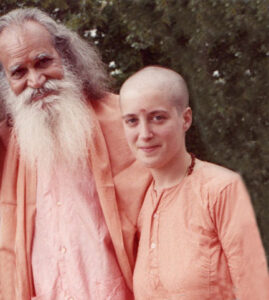 Swami Premananda is a senior disciple of Sri Gurudev Swami Satchidananda and served as his personal and traveling assistant for 24 years. In this capacity, she had numerous opportunities of spending time with Swamini A. C. Turiyasangitananda, as well as interviewing her for Integral Yoga Magazine. In 2006, again, humbly and generously donated to the making of Living Yoga: The Life and Teachings of Swami Satchidananda, for which Swami Premananda served as executive producer. She dedicated the film to Swamini, who passed just prior to the film’s completion. In addition to serving as editor of Integral Yoga Magazine, Swami Premananda serves as editor of Integral Yoga Publications, senior archivist for Integral Yoga Archives, and director of the Office of Sri Gurudev and His Legacy.
Swami Premananda is a senior disciple of Sri Gurudev Swami Satchidananda and served as his personal and traveling assistant for 24 years. In this capacity, she had numerous opportunities of spending time with Swamini A. C. Turiyasangitananda, as well as interviewing her for Integral Yoga Magazine. In 2006, again, humbly and generously donated to the making of Living Yoga: The Life and Teachings of Swami Satchidananda, for which Swami Premananda served as executive producer. She dedicated the film to Swamini, who passed just prior to the film’s completion. In addition to serving as editor of Integral Yoga Magazine, Swami Premananda serves as editor of Integral Yoga Publications, senior archivist for Integral Yoga Archives, and director of the Office of Sri Gurudev and His Legacy.

